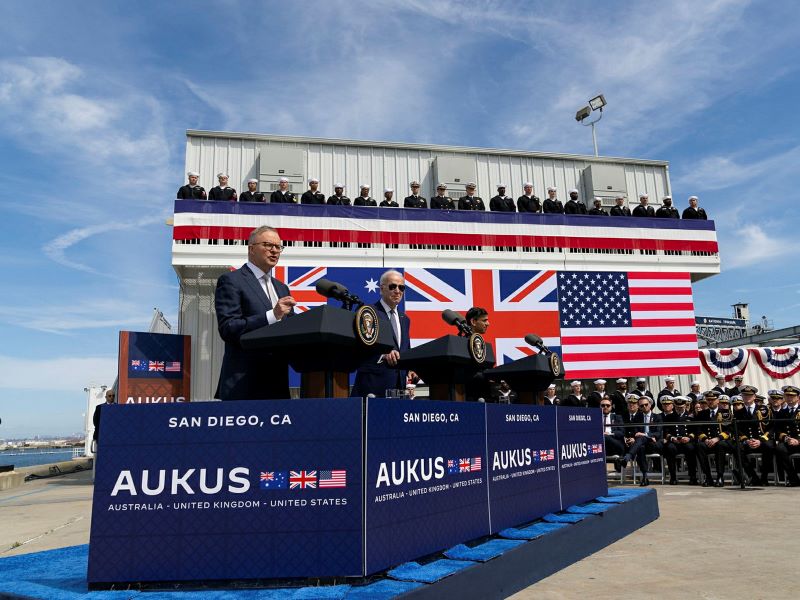Senior US officials have outlined plans to “clear a path” to AUKUS technology transfer, as lawmakers decried the “dire” state of the current approach to sharing cutting edge military technologies.
Last week, assistant secretaries from the US Department of Defence told the powerful US Foreign Affairs Committee that a three-pronged approach is underway to get more US military technology into the hands of allies – like Australia and the UK – sooner.
Existing trade mechanisms will be used in novel ways while “historic” legislation is drafted for a long-term approach, and Australia and the UK are urged to develop reciprocal arrangements.

At the hearing of the committee – which authorises billions in US arms sales – its chair, Congressman Michael McCaul decried the current military technology export framework, saying it was is “in dire need of reform” and claiming it was destabilising global security.
Mr McCaul said at classified meetings, AUKUS partners had pushed the US to do more to change the regulations.
“We heard from them that much more needs to be done,” he said. “Specifically, [International Traffic in Arms Regulations] and our antiquated arms sales processes need legislative fixes for AUKUS to be successful.
“One of our AUKUS partners dedicates 1 percent of their annual defense budget to simply navigate US export controls. In another case it took a year and a half of paperwork to support the upgrade of a weapons system that we previously sold to them.”
In response, US Defence assistant secretary Jessica Lewis outlined a new approach to the committee.
She said authorities would use an AUKUS trade authorisation mechanism as an interim solution for optimise technology sharing and defence trade between the nations.
Secondly and simultaneously, the Biden administration is consulting on legislative changes to “clear a path” for new exemptions for the sensitive exports.
“Under this legislative proposal,” Ms Lewis said, “AUKUS partners will have many transfers pre-approved and not subject to case-by-case review.”
Finally, the US would look for matching commitments from the other partners, Australia and the UK, including export controls that stop the technology being transferred again.
Defence minister Richard Marles has said the non-submarine components to AUSUK may be just as important and has acknowledged the barriers to information sharing already being encountered. In March, Mr Marles said the Australian and US governments are working to “reduce those barriers”.
“It is a big task, but I think there is a very significant commitment at the highest policy level to achieve that outcome,” he said.
According to Ms Lewis’s evidence last week, the initial stopgap is a ‘novel use’ of an existing trade authorisation mechanism. It would have an explicit AUKUS list of the projects and technologies included and excluded, as well as list of approved “communities or entities” from Australia and the UK.
Defining the exempted technologies would allow for pre-approval not on a case-by-case basis, Ms Lewis told the committee.
“All transfers under this authorisation could proceed without any further need for an authorisation or license while maintaining the records necessary to conduct compliance,” Ms Lewis said.
The long term legislative changes are aimed at allowing more exemptions to US licence requirements for AUKUS partners and faster permit transfers of both unclassified and classified Defence articles and services.
The faster approach on exports would be balanced against a need to “a calibrated approach to export controls”, the US official said.
The third element of the plan is to seek commitments from AUKUS partners “on shared standards for protection of defence information and material”.
“Export controls have only grown more important during this era of strategic competition,” Ms Lewis told the inquiry.
“For years, we have seen widespread evidence that our strategic competitors, including the People’s Republic of China, Russia, and then in addition, North Korea and Iran, are seeking to obtain and exploit our advanced military and civilian technologies.”
Do you know more? Contact James Riley via Email.

